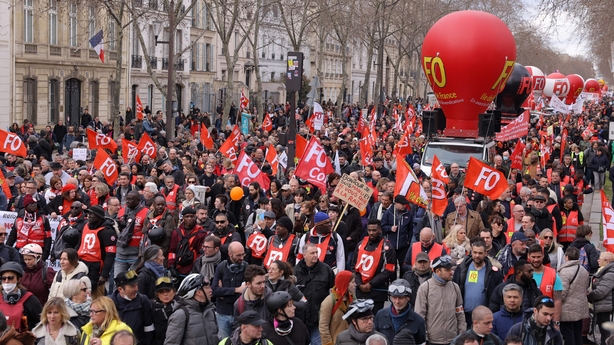Protesters marched across France in a last-ditch effort to convince politicians not to back President Emmanuel Macron's pensions reform bill that would raise retirement age by two years to 64.
A broad alliance of unions had called on workers to join the eighth day of nationwide demonstrations since mid-January against the unpopular policy.
The protests have drawn millions of people and walkouts have disrupted transport and energy sectors and left rubbish piling up in the streets of Paris.
Despite the backlash, Mr Macron pressed ahead with his plan.
The pension bill passed to a joint parliamentary committee where politicians from the lower and upper chambers are seeking a compromise text.
If a deal is reached, a final vote in both the Senate and National Assembly will be held tomorrow.
Protesters marched with home-made placards reading "No to 64 years", or union banners marked with slogans such as "Public and private sector together for our pensions".
"Politicians must look at what is happening in their constituencies," Laurent Berger, the head of France's biggest union, CFDT, told reporters before the start of the Paris rally.
This new day of protests "is meant to tell politicians: don't vote this reform", he said.

Mr Macron's camp faced a last-gasp scramble to secure enough votes in the assembly, where it lacks its own absolute majority and will rely on the conservative Les Republicains (LR) party for support, though its ranks are divided on the issue.
"In the National Assembly, there will not be an easy vote, nor will there be panic," government spokesman Olivier Veran told Europe 1 radio station.
Politicians on all sides spoke of senior ministers or their teams calling LR and centrist politicians to try and convince them to back the reform - sometimes offering favours for their constituencies in return.
Christophe Naegelen, of the centrist group Liot, where about 15 out of 20 will vote against the reform, said: "We've all received calls over the past days".
Several LR politicians said the same.
Sylvain Maillard, an MP in Mr Macron's camp said it was "normal" to have conversations between the government and politicians.
"It's not necessarily the minister who calls first. There may be an MP who's hesitating [about his vote], who speaks to a minister, who has some issues locally. A minister can help," he said.

Asked if that was unethical, Mr Maillard said: "The MP does his job, he pushes files for his constituency, he was also elected for that."
'People are determined and angry'
Mr Macron and his government said changes to the pension system, one of the most generous among industrialised nations, are necessary to keep the pension budget in the black.
At stake for the president are not just financial gains, but also his reformist credentials.
Ruling party officials acknowledged the numbers were tight.
If too tight for comfort, the government may resort to a procedure known as 49:3, which would allow it to push the text through parliament without a vote.
That would ensure the text goes through but would risk anger on the streets.
Prime Minister Elisabeth Borne told the assembly yesterday that she wanted a vote to take place, while the unions held their ground.
"People are determined and angry," said Philippe Martinez, the head of the hardline CGT union said.
More than 6,000 tonnes of rubbish have built up in Paris as municipal waste collectors extended their walkout into a second week.
France's energy sector has also been hit hard.
Blockages at four liquefied natural gas terminals have been extended, Engie subsidiary Elengy and trade sources said.
French power supply was reduced by the strike, and refineries were also affected.
